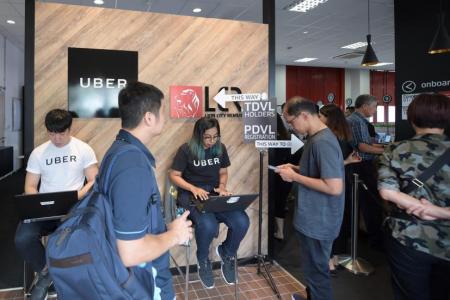Car rental firms offer salary, leave for Uber drivers
Terms differ, but most companies offer a fixed wage of at least $2,500 a month
Terms like a monthly salary, Central Provident Fund (CPF) contributions, medical coverage and annual leave have been dangled as carrots to entice potential Uber drivers.
Last week, the ride-hailing firm announced on its website that its "exclusive fleet partners" - car rental companies which lease cars to Uber drivers - are hiring full-time and part-time drivers as employees.
The New Paper found at least six car rental firms which have been trying to recruit drivers through ads on their Facebook page and websites like Carousell and Gumtree from as early as July.
Car rental firm AMV started hiring such drivers last November and now has more than 300 drivers.
The terms offered by the rental companies differ - most offer a fixed salary of at least $2,500 a month if the driver makes a minimum of 125-135 trips a week, with incentives given for each extra trip after they hit the target.
The driver also keeps the car without paying for rental, and gets an allowance for petrol and parking.
An Uber spokesman reiterated that these "driver-partners" are not employees of Uber, but that this is part of their continuous efforts to promote flexible earning opportunities for all.
She added: "We are helping interested drivers be aware of possible employment options with fleet partners, as a way to drive with Uber."
Car rental firms told TNP that they have been getting many enquiries.
They also said that offering employment opportunities was an alternative to slashing rental rates in the increasingly cut-throat industry.
According to Land Transport Authority data, there were more than 65,000 rental cars on the roads last month, more than double the number in 2015.
Mr Desmond Wong, 43, managing director of SD Progress, which has 10 to 20 drivers, said that the employment model will be more attractive after recent reports that the Inland Revenue Authority of Singapore has approached the ride-hailing firms to require their drivers to file their taxes automatically.
Unlike taxis, expenses such as fuel, vehicle rental fees, and Electronic Road Pricing charges are not tax-deductible for private-hire cars, noted the National Private Hire Vehicles Association.
Mr Wong added: "One of my drivers told me that he is more disciplined now because there is a quota to meet, unlike when he was a freelance driver."
Mr Derrick Ho, 46, manager of YSC Premium, which employs more than 100 drivers, said that some drivers are attracted to the employment scheme because they can't afford to pay the deposit, or want to try out the job without getting locked into a rental contract.
Transport experts said that some private-hire drivers might be enticed by the stability of this employment model, given its "respectable" salary and benefits like CPF contributions.
Assistant Professor Terence Fan of Singapore Management University said: "The aggressive marketing of Grab and Uber has raised the profile of private-hire drivers, and it is now seen as (just) another job.
"But the ride-hailing company also has to ensure that there is sufficient demand to allocate rides to the drivers."
Singapore University of Social Sciences economist Walter Theseira pointed out that the pool of private-hire drivers might decrease as the job market recovers.
"The industry also recognises that there is an excess of vehicles, but too few drivers," he added.
Get The New Paper on your phone with the free TNP app. Download from the Apple App Store or Google Play Store now


